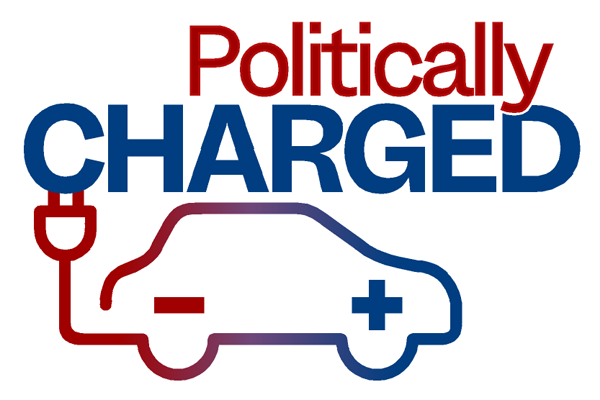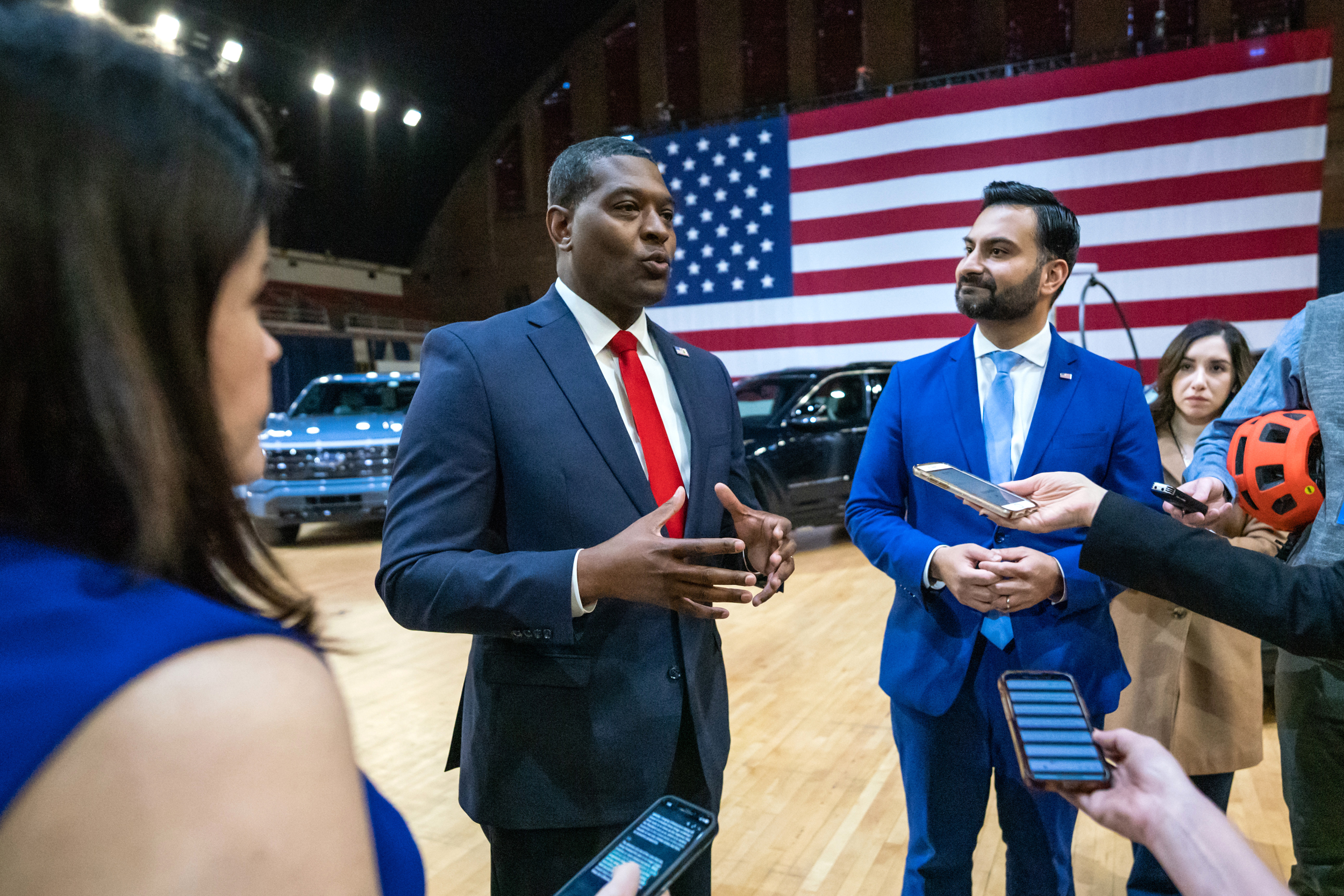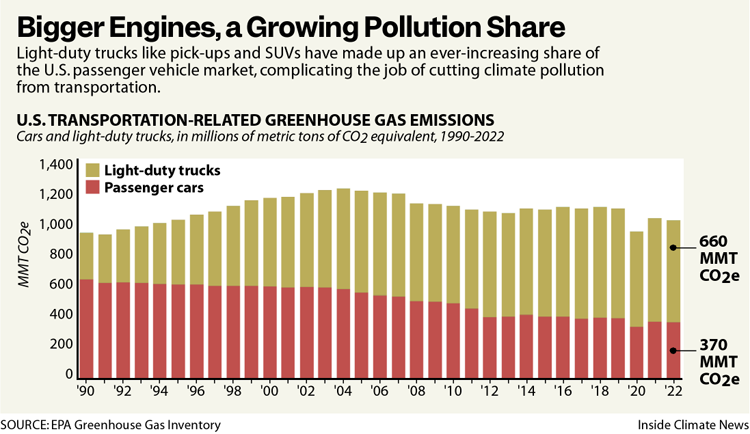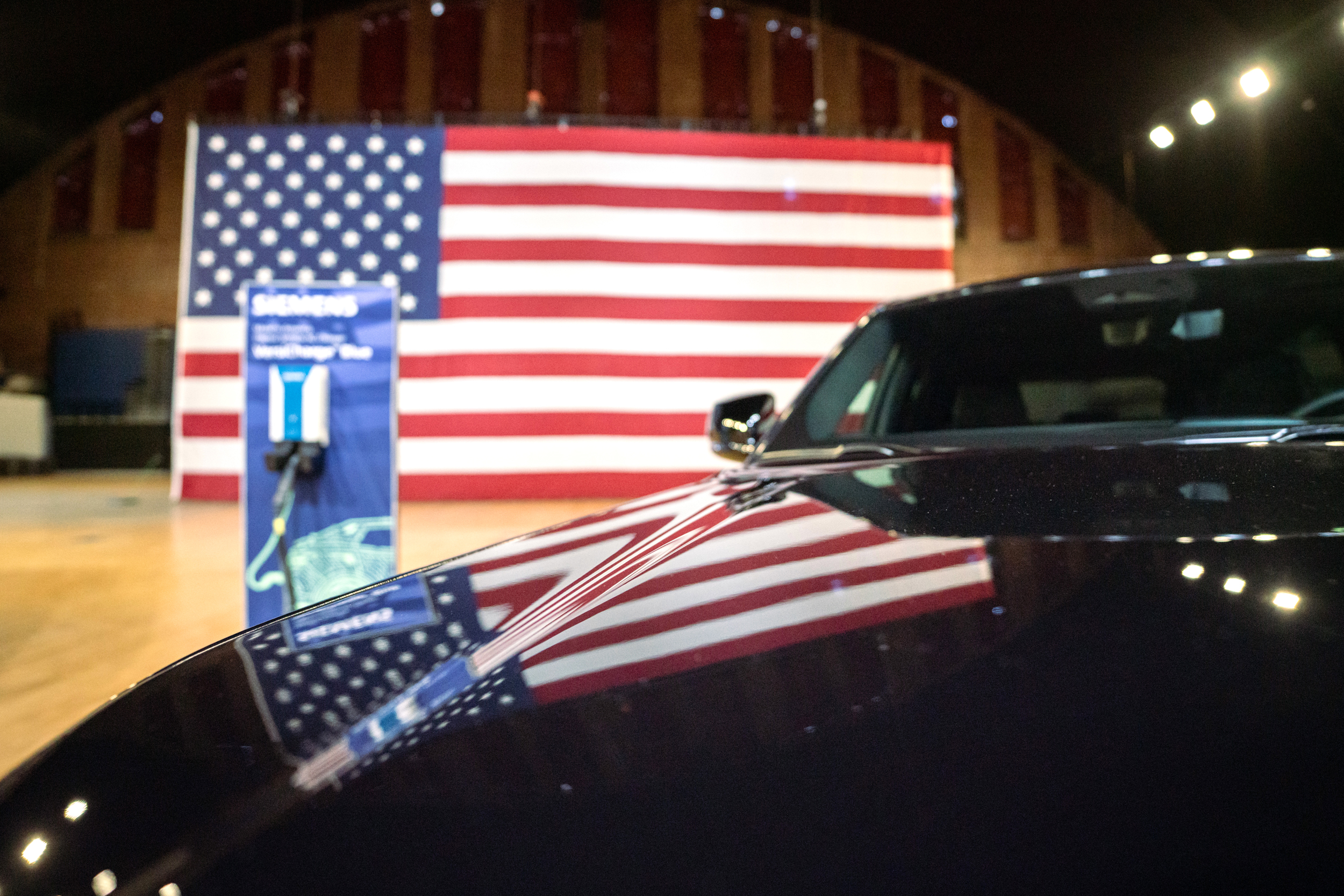Electric Vehicles Strain the Automaker-Big Oil Alliance
Politically Charged: Fourth is a series about how political polarization threatens the EV future.
Since the dawn of U.S. environmental law more than half a century ago, America has tried to reconcile its love of the automobile with its hope for a liveable future.
And whether the battle was over the smog that choked cities, the toxic lead that poisoned millions or the carbon dioxide that is heating the planet, two of the nation’s most powerful industries were at the forefront of the effort to shape U.S. auto policy: the companies that made the vehicles and the businesses that fueled them.
The auto industry and the oil industry both worked to slow regulation. But they also clashed with each other at times. Was the solution to require automakers to install pollution controls or to force refiners to pump out cleaner gasoline? In the end, after years of struggle and delay, the United States adopted rules to do both. And yet, those measures proved inadequate in the face of the inexorable advance of climate change.
Explore the latest news about what’s at stake for the climate during this election season.
Now, the electric car has touched off what might be the ultimate lobbying battle for both the auto and oil industries. Carmakers are seeking to slow the pace of the Biden administration’s drive for cleaner vehicles. Oil companies are seeking to bring it to a halt.
No voice has amplified the Big Oil message more loudly than former President Donald Trump, who at a fundraiser in April explicitly pledged to help the industry in exchange for its members sending $1 billion to his campaign, The Washington Post first reported. Trump blasts President Joe Biden’s EV-friendly policy at nearly every public appearance, including after his conviction in New York on charges of falsifying business records, when amid grievances about the judicial system, he stated: “They want to stop you from having cars.”
In this seeming non sequitur, Trump was merely reiterating one of the major themes of his bid to regain the presidency. Echoing the oil industry’s own language, he has framed his candidacy as its best hope for undoing U.S. policy to spur adoption of EVs.

To cut greenhouse gas emissions from U.S. passenger vehicles in half by 2032—as Biden’s rules call for—automakers are expected to rely on the electric drive technology into which they’ve already poured billions of dollars, spurred by subsidies at home and competition abroad. “The future is electric,” said John Bozzella, president and CEO of the Alliance for Automotive Innovation, appearing at the rollout of the regulations in March.
But the American Petroleum Institute and its sister group, the American Fuel & Petrochemical Manufacturers Association, have declared battle against that EV future. Although the oil industry still rakes in huge profits and global fuel demand keeps rising, that’s not a guarantee the status quo will continue.
EVs have opened a divide between the auto industry and the oil industry, in the view of David Kieve, a former adviser to Biden who now heads EDF Action, the political advocacy partner of the Environmental Defense Fund. Kieve was in the audience when the Environmental Protection Agency announced the new vehicle pollution standards in Washington.
“That was an exciting moment for us,” Kieve said. “At the same time, oil and gas interests, which see an all-electric future as an existential threat to their ability to profit off of the sale of gasoline, are trying to turn this into a false argument about choices—falsely claiming that the American people’s choices are going to suffer. The truth is that consumers have the freedom to choose the vehicle that’s best for them right now. No one’s choice is being taken away.”

But the message the oil industry is bringing to airwaves, social media, the courts and the 2024 political campaign is that American consumers will be squeezed in an EV transition. The Biden vehicle pollution rules “will unequivocally eliminate most new gas cars and traditional hybrids from the U.S. market in less than a decade,” said API President and CEO Mike Sommers and AFPM President and CEO Chet Thompson in a joint statement. “This wildly unpopular policy is going to feel and function like a ban.”
EDF Action is among the environmental advocacy groups seeking to counter the oil industry’s arguments. But it remains unknown whether the auto industry, which always has had a smaller lobbying and political action presence than Big Oil, will be an effective voice opposing anti-EV policy messaging. Meanwhile, the oil industry is counting on an extensive array of like-minded cohorts: the think tanks it funds and other businesses—including car dealers and farm interests—that it is rallying to its side.
An Alliance Forged Over Smog
The oil and car industries have worked in tandem, if not in partnership, to block government action against auto pollution ever since the first recorded “gas attack” in Los Angeles in 1943—eye-watering smog that cut visibility to three blocks.
Fossil fuel exhaust was fingered as the cause of the smog as early as the late 1940s, when legendary chemist Arie Jan Haagen-Smit at the California Institute of Technology isolated brown hydrocarbon goo in a Los Angeles air sample. But in a move that would presage the efforts decades later to cast doubt on climate science, the oil industry hired its own expert.
Abraham Zarem, the oil industry-paid scientist and a prominent veteran of the Manhattan Project, hypothesized that naturally occurring stratospheric ozone was somehow seeping into the lower atmosphere to cause L.A.’s smog, according to writings and oral histories of the CalTech team. He was wrong, but his comments launched 20 years of debate and delay before the first auto pollution standards, set by the state of California in 1968, became law. Congress followed in 1970 with the Clean Air Act.
By then, the oil and auto industries—who had initially joined in a research alliance on smog—were at odds with the government and each other.
“In my opinion, it’s Detroit’s problem to meet the standards,” said Peter Gammelgard, senior vice president of the American Petroleum Institute, at a congressional oversight hearing in 1973. “They have to be the ones that make the engines and make the devices that do meet the standards.”
General Motors Vice President Ernest Starkman said his company was “desperately trying” to implement catalytic converters to reduce smog-forming pollution, but the oil industry could cut air pollution without such equipment if it eliminated lead, the additive it used to boost performance. “Unleaded gasoline is absolutely necessary,” Starkman testified.
Lead is a powerful neurotoxin, but the auto industry also wanted it gone because it destroys catalytic converters. Permanent removal of lead from gasoline, achieved in 1997 in the United States, is now viewed as one of the world’s greatest regulatory success stories, saving 1.2 million lives and $2.45 trillion in health and societal costs globally each year, according to United Nations-commissioned research.
A go-slow pattern was established in those early auto pollution fights. Both industries sought delay, with the auto industry ultimately adopting new technologies and the oil industry at least a step behind.“There was tension, which sometimes was resolved with actual summit meetings between leaders on both the auto and the fuel side,” noted Mary Nichols, former chair of the California Air Resources Board, or CARB, and 45-year veteran of the agency.
“…all of the sudden, the environmental community, the car companies and the EPA were in one place, saying, ‘Yes, you can do that,’ and the oil industry was fighting us.”
The rift widened after 1990, when Congress overhauled the Clean Air Act and gave the EPA power to tighten tailpipe pollution standards. Automakers ultimately agreed to deploy advanced catalysts to make vehicle exhaust cleaner. But once again, that solution was undercut by the make-up of the fuel—this time, by the naturally occurring sulfur, which rendered advanced catalysts ineffective and was harmful to health. The American Motor Vehicle Manufacturers Association filed a formal petition demanding that the EPA force the oil industry to clean up its act too. President Bill Clinton’s administration responded with the first regulations requiring refiners to reduce sulfur in fuel.
“The oil industry was very upset,” recalled Margo Oge, who began her 18-year tenure as director of EPA’s office of transportation and air quality amid the controversy. “But the interesting part is all of the sudden, the environmental community, the car companies and the EPA were in one place, saying, ‘Yes, you can do that,’ and the oil industry was fighting us.”
In 2004, the sulfur rules were fully implemented and President George W. Bush’s EPA assured Congress that the impact on the price at the gas pump had been “minimal.”
By then, however, Bush’s EPA was embroiled in a far more profound auto pollution issue, one that couldn’t be solved by adding equipment to exhaust systems or tweaking the fuel refining process. In 1999, a coalition of states, cities and environmental groups petitioned the agency to regulate greenhouse gas emissions from motor vehicles. The all-too-apparent solution—to reduce fuel burning in the short term and abandon the internal combustion engine in the long run—had the potential to sever entirely the strained ties between the auto and oil industries.
As EVs Advance, the Oil Lobby Shifts Into High Gear
For much of the past 25 years, the auto industry has appeared to be as devoted as the oil industry to maintaining the fossil-fueled status quo.
What was then called the Alliance of Automobile Manufacturers, for example, intervened in court in support of the Bush administration when it was sued over its stand that the EPA had no authority to regulate climate pollution from motor vehicles. The Supreme Court rejected that position in its landmark 2007 Massachusetts v. EPA decision, holding that greenhouse gas emissions were pollutants under the Clean Air Act. The oil industry filed no briefs of its own in that landmark case, reflecting how, in the view of close observers, it took a back seat in those preliminary fights.
“It really was the auto industry that was at war against [Corporate Average Fuel Economy] standards and cleaner, more efficient vehicles,” said Daniel Becker, director of the Center for Biological Diversity’s Safe Climate Transport Campaign.
But now that electric vehicles are within reach for more consumers, thanks to government support under the Biden administration and global competition that has driven down costs, the oil industry is unquestionably at the forefront of the fight against new rules designed to accelerate the EV transition. “I do think that the oil industry has gone from, ‘Meh, we’re not big fans, but we’re not going to fight it,’ to definitely fighting it,” Becker said.
The American Petroleum Institute sued the Biden administration on June 13 over the vehicle rules, leading a business coalition that includes long-time allies—auto dealers—as well as erstwhile rivals: corn producers, who have long fought the oil industry over ethanol standards. Now, both the oil and farm lobbies are united in opposition to the government EV push.
U.S. automakers have a more complicated stance. They have invested billions of dollars in EV technology; without it, industry analysts agree they will be left behind as electric drive takes off worldwide, due in part to competition from low-cost Chinese EVs that are not available in the United States. At the same time, the industry has become heavily reliant on big SUVs and pick-up trucks, sales statistics show. They are the industry’s most profitable vehicles, analysts say.

Becker argues it’s because of these money-making gas guzzlers that automakers continue to lobby for the government to go slow on EVs.
“What’s the old line? ‘Oh, Lord, make me chaste, but not quite yet,’” quipped Becker.
Auto lobbyist Bozzella telegraphed support for the Biden vehicle rules by appearing at the rollout, flanked by a Ford pick-up, a Jeep and a Cadillac, all of them in varying shades of blue and with different iterations of electric drive. But he admitted his group lobbied hard to shape the regulations, including easing implementation. “I know I’ve been a thorn in your side this past year,” he remarked to Biden administration officials. The manufacturers’ case was bolstered by the United Auto Workers, concerned about the loss of jobs in internal combustion plants while the union is still working to establish its presence in EV plants.
For the auto industry, flexible rules are better than no rules at all—as carmakers learned in the chaos that ensued during the Trump administration’s dramatic reversal of President Barack Obama’s climate policies. It triggered a huge battle with states that sought tougher standards, led by California, the nation’s leader in EV sales. Ultimately, the industry divided over the issue, with some automakers joining in a deal with California while it battled the Trump EPA.
The Biden administration saw an opportunity for a reset, for which the auto industry laid the groundwork early in 2020, merging separate domestic and global automaker trade groups into one organization with a forward-looking name, the Alliance for Automotive Innovation.
In a court brief the Alliance filed in 2022, it explained its support of the Biden administration’s early moves to reinstate the greenhouse gas emissions rules eliminated by Trump.
“To be sure, the GHG Rule will challenge the industry, but EPA designed the Rule to balance overall stringency with critically important flexibilities,” the carmakers wrote.
In that same case, now awaiting a decision by the D.C. Circuit, the oil industry is opposing Biden EV policy, portraying it as a high stakes battle—not just for the companies but also the country. Trade groups representing the Texas and Louisiana oil industry called the greenhouse gas rules “a clear and present danger to these states and the nation’s prosperity and survival.”
The oil industry groups invoked a judicial principle—the “major questions” doctrine—that was seldom used until 2022, when the conservative Supreme Court, shaped by Trump, ruled to limit the EPA’s power to regulate electric power plants’ carbon emissions. Because greenhouse gas emissions were a “major question” affecting the nation, the court ruled, the EPA could only act on power plants within the bounds explicitly spelled out by Congress. Now, the oil industry groups are arguing the courts should do the same on the vehicle rules.
“Whether U.S. citizens and businesses can continue to use the vehicles of their choice or whether the government should mandate an abrupt shift to electric vehicles is, of course, a Major Question of National Policy,” they wrote. “At a minimum, the impact would be radical and lead to massive transformations in the vehicle manufacturing industry, the oil and gas industry, and the public power generation industry. The destructive ripple effects in other indirect industry sectors would be massive and probably immeasurable.”
A Bigger Fight, A Different Battle
The oil industry may not prevail with its legal argument. The EPA’s authority in the Clean Air Act to act on motor vehicle pollution is more explicit than the provision the agency relied on to regulate power plants.
The rules do not mandate electric vehicles, as the oil industry argues. Instead, they set pollution-reduction goals, which the EPA says are achievable because of EV technology.
Now the oil industry is taking its case not just to the courts, but directly to consumers and voters, in a “Don’t Ban Our Cars” advertising campaign, on which the American Fuel & Petrochemical Manufacturers are spending more than $10 million.
The ads urge viewers to call their members of Congress and urge them to vote to overturn the EPA regulations.
But Biden supporters believe the significance of the campaign is its collateral impact, spreading the misleading message in an election year that Biden and Democrats are trying to ban cars. The American Fuel & Petroleum Manufacturers is running the ads in states most likely to be pivotal in the presidential race—Arizona, Georgia, Michigan, Nevada, Pennsylvania and Wisconsin—as well as in Ohio and Montana, states crucial to Democrats’ bid to maintain control of the Senate.

The oil industry has been considering how to sway public opinion on EVs for some time, according to documents obtained by Congressional Democrats in a recent investigation into the industry’s role in spreading climate misinformation. One internal American Petroleum Institute email in July 2018 described the organization’s efforts at “EV message testing” and its finding that nearly half of the 73 percent of the public who then supported government EV subsidies were “moveable”—that is, their minds could be changed.
Some of the themes that the API research identified as persuasive—the expense of EVs and the impact of their raw materials—have become a regular part of the political discourse this election year. House GOP members sounded them in a May letter calling for the EPA to “end their effort to dictate the cars that Americans drive.” Trump has made anti-EV riffs a regular feature at his campaign rallies, in one fiery moment this spring saying they will provoke “a bloodbath” for the economy.
It is not clear yet how the oil and gas industry has responded to Trump’s direct call this spring for $1 billion in support in return for action to roll back regulations. But one of Trump’s biggest donors, with $5 million in support so far, is CrownQuest Petroleum of Midland, Texas. Its CEO, Tim Dunn, a major supporter of conservative groups and causes throughout that state, sits on the board of the Texas Public Policy Foundation, a think tank that regularly churns out anti-EV talking points.
Overall, the oil and gas industry has donated more than $111 million to political campaigns so far in this election cycle—the vast majority going to Republicans, according to the watchdog group Open Secrets. In contrast, auto manufacturers and their trade groups have given about $3.6 million to candidates, with about 53 percent going to Democrats.
EDF Action has sought to counter the anti-EV messaging with its own advertising campaign, spending $1 million last fall in Pennsylvania and another $700,000 in Michigan this spring. Its ads featured an auto dealer talking about how EVs require less maintenance, a retired nurse describing the money she has saved by going electric and a Republican Air Force veteran raving about his EV’s performance. Kieve, director of EDF Action, calls it “lifting up real people’s voices” to counter the notion that electric vehicles are not for everyone.
But recent polls indicate most American consumers still aren’t convinced. EV sales have not increased as quickly as some predicted. Costs and lack of charging infrastructure are still widely seen as problems. Consumers also mention worries about the environmental effects of raw material mining, a favored theme of the oil industry, despite its own impacts on land, water and the atmosphere.
“The effort to create doubt has had an impact,” said Nichols, the former California regulator. “Well-funded social media campaigns can have an impact on individuals and their beliefs if they keep being hit with the same messages over and over again, even if the reality is quite different.”
Oge, the former EPA regulator, is more philosophical.
“I’m not surprised that we’re seeing this kind of strong negative reaction by the oil industry,” she said. “We’re just starting. I expect both for cars and trucks, the fight with the oil industry will continue in many forms. There’s going to be legal challenges, political challenges, and we’ll see massive disinformation across the board, with social media making it easier.”
This battle is different and will be more hard-fought for oil companies than the pollution battles of the past, Oge said, because it has the potential to end their role as stakeholders.
“We’re not asking them to fix the quality of the fuel. We’re saying that we as a country and the globe as a whole should get away from burning fossil fuels,” she said. “So that’s where we find ourselves now. We find ourselves in a bigger fight.”
About This Story
Perhaps you noticed: This story, like all the news we publish, is free to read. That’s because Inside Climate News is a 501c3 nonprofit organization. We do not charge a subscription fee, lock our news behind a paywall, or clutter our website with ads. We make our news on climate and the environment freely available to you and anyone who wants it.
That’s not all. We also share our news for free with scores of other media organizations around the country. Many of them can’t afford to do environmental journalism of their own. We’ve built bureaus from coast to coast to report local stories, collaborate with local newsrooms and co-publish articles so that this vital work is shared as widely as possible.
Two of us launched ICN in 2007. Six years later we earned a Pulitzer Prize for National Reporting, and now we run the oldest and largest dedicated climate newsroom in the nation. We tell the story in all its complexity. We hold polluters accountable. We expose environmental injustice. We debunk misinformation. We scrutinize solutions and inspire action.
Donations from readers like you fund every aspect of what we do. If you don’t already, will you support our ongoing work, our reporting on the biggest crisis facing our planet, and help us reach even more readers in more places?
Please take a moment to make a tax-deductible donation. Every one of them makes a difference.
Thank you,
David Sassoon
Founder and Publisher
Vernon Loeb
Executive Editor
Share this article
Disclaimer: The copyright of this article belongs to the original author. Reposting this article is solely for the purpose of information dissemination and does not constitute any investment advice. If there is any infringement, please contact us immediately. We will make corrections or deletions as necessary. Thank you.
Title:Electric Vehicles Strain the Automaker-Big Oil Alliance
Url:https://www.investsfocus.com




